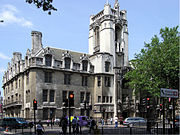Cadder ruling
| Cadder v HM Advocate | |
|---|---|
 |
|
| Court | Supreme Court of the United Kingdom |
| Full case name | Cadder v Her Majesty's Advocate |
| Decided | 26 OCtober 2010 |
| Citation(s) | [2010] UKSC 43, 2011 S.C. (U.K.S.C.) 13 |
| Case history | |
| Related action(s) | McLean v HM Advocate 2010 SLT 73 |
| Case opinions | |
| By not being able to have access to a solicitor prior to being interviewed by the police, Cadder's rights under Article 6(1) ECHR had been breached. | |
| Court membership | |
| Judge(s) sitting | Lord Hope (Deputy President), Lords Rodger, Walker, Brown, Mance, Kerr and Dyson |
Cadder v HM Advocate [2010] UKSC 43 (26 October 2010) is a decision in which the Supreme Court of the United Kingdom held that the way in which police in Scotland detained suspects was not compatible with the European Convention on Human Rights and was therefore unlawful in terms of the Scotland Act 1998.
Peter Cadder was convicted at Glasgow Sheriff Court of assault and breach of the peace on 29 May 2009, following an incident in May 2007.
Cadder had been detained under section 14(1) of the Criminal Procedure (Scotland) Act 1995 and interviewed by two officers from Strathclyde Police at London Road Police Office in Glasgow. In August 2008 an identity parade was held at which the complainer, John Tacey, was unable to identify anyone. In the subsequent court case the Crown relied upon evidence obtained within Cadder's police interview to help to prove their case.
Cadder attempted to lodge an appeal in the Court of Criminal Appeal in Edinburgh on the grounds that it was a breach of Article 6(1) (Right to a Fair Trial]) of the European Convention on Human Rights (ECHR) that he was unable to have a solicitor present during his police interview. At the first sift stage a High Court judge refused his appeal on the basis of the full-bench decision in McLean v HM Advocate ([2010] SLT 73), which had concluded that there were sufficient safeguards within Scots Law to ensure that there was no breach of Article 6(1) in having no solicitor present. Cadder appealed against the refusal and three judges refused it again in November 2009 at the second sift stage.
...
Wikipedia
